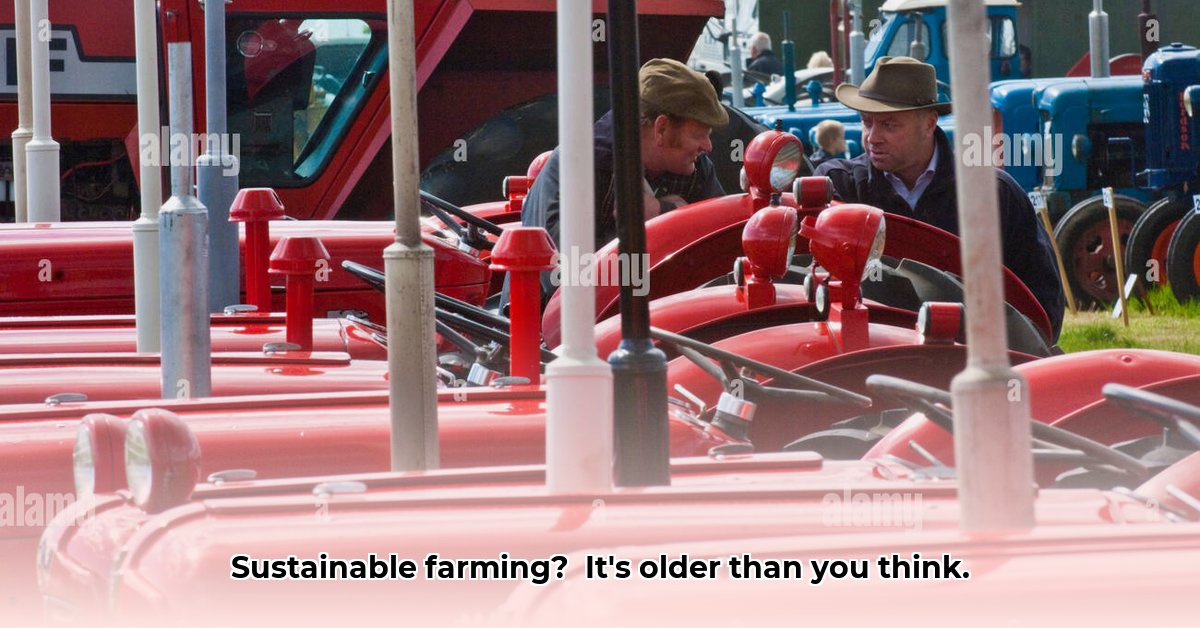
Unearthing the Past at Pennsylvania Tractor Shows
The rhythmic chug of a meticulously restored engine, the scent of aged steel and well-worn leather – these are the sensory hallmarks of a Pennsylvania tractor show. More than a nostalgic gathering, these events, such as the Lebanon Valley Indoor Classic and the antique tractor display at the Pennsylvania Maple Festival, offer a surprisingly relevant lens through which to view the future of sustainable agriculture. These aren't just shiny relics; they’re living embodiments of principles crucial for a more environmentally conscious food system. They represent practical lessons in durability, resource efficiency, and community-based knowledge sharing – elements vital for a resilient agricultural future. For more on antique tractors, see this great resource: Antique John Deere Tractors.
Lessons from the Past: Building to Last and Working Smarter, Not Harder
These shows are treasure troves of practical wisdom. Many tractors, decades or even a century old, still function flawlessly. What allowed for such astonishing longevity? What design principles—perhaps lost to time—can inform the creation of more durable, sustainable modern machinery? It's not solely about the machines themselves; older farming methods often prioritized resource optimization, maximizing every drop of fuel and every ounce of fertilizer. This wasn't just about productivity; it was about thoughtful, sustainable resource management. Can we re-learn these efficient methods and apply them to modern agricultural challenges? The restoration of these machines is essentially reverse-engineering sustainability – deciphering the secrets of long-lasting construction and translating them into 21st-century solutions. A key question to consider is: how can we leverage the ingenuity of these historical designs to reduce the environmental footprint of modern farming?
The Community Spirit: Sharing Knowledge, Growing Together
Beyond the gleaming chrome, Pennsylvania tractor shows foster vibrant communities, actively passing down generations of agricultural knowledge. Seasoned mechanics patiently mentor newcomers, creating a continuous stream of informal education. This organic knowledge transfer is crucial for building resilience within farming communities. It's not just about fixing tractors; it's about cultivating a supportive network, essential for the future of sustainable agriculture. How can we best leverage this organically-developed knowledge base to tackle contemporary challenges?
Connecting the Dots: Antique Tractors and the Future of Sustainable Farming
The connection between antique tractors and sustainable agriculture might initially seem tenuous. However, the emphasis on repair, reuse, and resource efficiency found in antique tractor restoration aligns perfectly with the core principles of sustainable farming. These lovingly restored machines serve as powerful symbols of a more sustainable agricultural approach. How can we effectively utilize these shows as impactful educational platforms? Imagine workshops on sustainable repair techniques, demonstrations of resource-efficient farming methods, and discussions on building more resilient food systems.
Actionable Steps: Turning Nostalgia into Action
Transforming this nostalgic appreciation into concrete action requires a multi-pronged approach:
- Show Organizers: Integrate educational components into events. Partner with agricultural colleges to offer workshops on sustainable maintenance and environmentally-friendly fuels.
- Colleges and Universities: Incorporate antique tractors and vintage farming practices into relevant curricula. Fund research comparing the resource efficiency of old and new methods.
- Sustainable Agriculture Advocates: Use tractor shows as outreach platforms, highlighting the link between historical and modern sustainable farming practices.
- Collectors and Hobbyists: Document restoration projects and create accessible online resources for wider knowledge distribution.
- Local Governments: Sponsor and promote these events as valuable educational and community resources, investing in supporting infrastructure.
Facing the Challenges: Overcoming Hurdles on the Road to Sustainability
Challenges remain. Parts for antique tractors can be scarce, requiring ingenuity and patience. Maintenance demands specific skills. But these aren't insurmountable. Community workshops, online resource sharing, and collaborative initiatives can help overcome these hurdles, strengthening the community and solidifying the link between past and future.
The Future of Pennsylvania Tractor Shows: A Legacy for Tomorrow
Pennsylvania tractor shows are already unique blends of entertainment and preservation. By highlighting the connection between historical practices and modern sustainability goals, they can become even more vital. They hold the key to unlocking a deeper understanding of our agricultural past, one that can inform and inspire a more sustainable future for farming.
How to Apply Antique Tractor Restoration Techniques to Modern Sustainable Farming
Key Takeaways:
- Antique tractors embody durable, efficient designs applicable to modern sustainable farming.
- Restoration provides valuable hands-on learning in mechanical skills and resourcefulness.
- The community aspect fosters knowledge sharing and resilience among farmers.
- Modern technologies can be integrated with restored tractors, optimizing sustainability.
- Careful restoration and maintenance effectively mitigate associated risks.